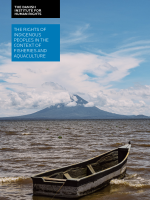
The rights of Indigenous peoples in the context of fisheries and aquaculture
For millennia, the existence of many indigenous peoples across the world has been closely intertwined with the sea, their livelihoods and culture being deeply tied to marine and coastal ecosystems, whether exclusively or partially. Yet, the rights of indigenous peoples depending on marine and coastal ecosystems are threatened throughout the world.
This brief examines the respect, protection and fulfilment of Indigenous peoples’ rights to marine resources, marine territories and coastal land, and give guidance for indigenous peoples on what can be claimed in relation to specific human rights. Reference is made mainly to provisions in the UN Declaration on the Rights of Indigenous Peoples (UNDRIP) and the ILO Indigenous and Tribal Peoples Convention, 1989 (No. 169).
The brief also gives a few country examples of the application of specific human rights. Other relevant international instruments on indigenous peoples and fisheries and aquaculture are also briefly introduced in addition to UNDRIP and ILO C169).
We strive to make the pdf versions of our publications etc. accessible for screen readers. If you experience any problems, please contact Digital Editor Stine Juhl Nielsen on stni@humanrights.dk
